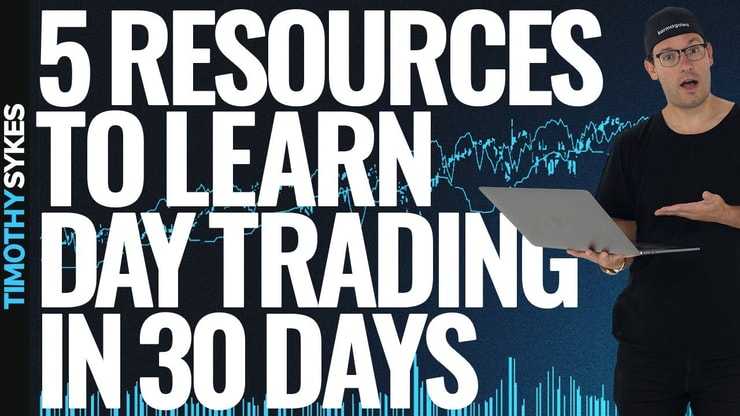Day trading involves buying and selling securities within the same trading day. Traders capitalize on short-term price movements in stocks, ETFs, or derivatives, aiming for quick profits. Unlike long-term investments, day trading focuses on momentary market trends and price volatility. It appeals to those who desire direct engagement with the financial markets and have the time to dedicate to this demanding activity.
You should read this article because it offers a comprehensive guide to day trading, covering everything from basic concepts to advanced strategies, and provides practical tips for both beginners and experienced traders.
I’ll answer the following questions:
- What is day trading and why is it appealing?
- How does day trading work and what strategies are involved?
- What are the first steps for a beginner in day trading?
- Who can make a living by day trading?
- What are the best day trading strategies for beginners?
- What risks and challenges are associated with day trading?
- How does day trading differ from other types of trading?
- Is day trading suitable for everyone?
Let’s get to the content!
Table of Contents
- 1 How Does Day Trading Work?
- 2 How Does a Day Trader Get Started?
- 3 Who Makes a Living by Day Trading?
- 4 Best Day Trading Strategies for Beginners
- 5 Risks and Challenges in Day Trading
- 6 Day Trading vs. Other Types of Trading
- 7 Day trading is for you if:
- 8 Day trading is not for you if:
- 9 Key Takeaways
- 10 Frequently Asked Questions
- 10.1 What Is the First Rule of Day Trading?
- 10.2 Can You Get Rich Day Trading?
- 10.3 What Skills Are Required for Day Trading for a Living?
- 10.4 What Are the Basics of Day Trading?
- 10.5 How Do Financial Services and Products Impact Day Trading?
- 10.6 What Is the Role of Insurance and Real Estate in Day Trading?
- 10.7 How Can Advice and Guidance Improve Day Trading Skills?
- 10.8 How Do Market Strategies and Analysis Apply to Day Trading?
- 10.9 What Are Some Advanced Day Trading Techniques?
- 10.10 How Do Student Loans and Mortgage Lenders Affect Day Traders?
- 10.11 Why Is Choosing the Right Brokerage Firm and Financial Service Provider Essential in Day Trading?
How Does Day Trading Work?

Day trading involves making quick decisions to buy and sell securities within the same trading day, capitalizing on short-term price movements. The goal is to end the day with a net profit after accounting for commissions and fees. This requires constant market monitoring, using tools like technical analysis, chart patterns, and indicators to predict market movements.
Understanding the nuances of the market is crucial. It’s not just about quick decisions; it’s about informed choices based on a solid grasp of trading fundamentals. For those looking to delve deeper into this world, a comprehensive guide to day trading can be invaluable. It covers everything from basic concepts to advanced strategies, offering insights into how to navigate the complexities of the market effectively. Whether you’re a beginner or an experienced trader, enhancing your knowledge is key. Dive into the world of day trading with this detailed day trading guide, covering all you need to know to succeed.
Successful day trading hinges on understanding market trends, momentum, and movements. Traders often rely on a variety of strategies, like scalping, where they make numerous trades to profit from small price changes, or swing trading, which involves holding positions for a slightly longer duration to capitalize on larger market movements. It’s a high-stress, high-stakes environment, demanding discipline and an analytical mindset.
In my experience teaching trading strategies, I emphasize the importance of a solid trading plan and risk management. It’s not just about choosing stocks or securities; it’s about managing your capital wisely, understanding leverage, and being prepared for the inherent risks. Day trading requires continuous learning and adaptation, as market conditions can change rapidly.
How Does a Day Trader Get Started?
For beginners, starting in day trading can seem daunting. The first step is gaining a thorough understanding of the stock market and trading principles. This can be achieved through courses, reading articles, and studying market trends. Next, setting up a brokerage account with a reliable broker like TD Ameritrade or Interactive Brokers is essential, as they provide the necessary tools and platforms for trading.
Developing a trading strategy is crucial. This involves choosing what securities to trade, whether stocks, bonds, or ETFs, and deciding on a method, such as scalping or range trading. Beginners should start with a small investment and gradually increase their exposure as they gain experience. Practice with a demo account is invaluable, as it allows aspiring day traders to simulate real trades without financial risk.
As a seasoned trader and instructor, I’ve seen the importance of discipline and patience in trading success. Beginners should be prepared for the stresses of trading and develop habits that promote sound decision-making. Remember, day trading is not just about making profits; it’s about managing risks and learning from each trade to refine your strategy continuously.
Who Makes a Living by Day Trading?

Day trading can be a lucrative career for those who master the art and science of the financial markets. Successful day traders are typically well-educated in the field, have a deep understanding of market movements, and are adept at various trading strategies. They are disciplined, making decisions based on analysis and research rather than emotion.
This career is not limited to financial experts or those with degrees in finance. Many successful day traders come from diverse backgrounds but share a passion for the markets and a commitment to continuous learning. They spend hours studying market trends, economic news, and technical indicators, constantly refining their strategies to adapt to the ever-changing market.
In my teaching experience, I’ve seen individuals from various careers transition into successful day traders. They often start trading as a side activity and gradually move into full-time trading as they build their skills and confidence. The key is not just intelligence or education; it’s about having the discipline to stick to a strategy, manage risks, and maintain emotional control under pressure.
Best Day Trading Strategies for Beginners
For beginners, some of the best day trading strategies include range trading, scalping, and momentum trading. Range trading involves identifying stocks that are fluctuating between consistent high and low prices and trading within that range. Scalping is making numerous small trades to capitalize on minute price changes. Momentum trading focuses on stocks moving significantly in one direction on high volume.
In my teaching, I stress the importance of choosing a strategy that aligns with your personality and risk tolerance. For instance, scalping requires intense focus and quick decision-making, while range trading might suit those who prefer analyzing patterns over a longer period. Fundamental analysis and technical analysis are valuable tools for any strategy, helping traders understand market conditions and make informed decisions.
Beginners should start with a clear trading plan, defining their investment strategy, target profits, and acceptable losses. Practicing with a demo account helps in understanding market dynamics without risking real money. Remember, each strategy has its risks, and it’s crucial to be aware of them before diving into the trading world.
After understanding the basics, the next step is refining your day trading strategy. This involves more than just selecting the right securities; it’s about developing a method that aligns with your goals and risk tolerance. From scalping to momentum trading, each approach requires different skills and mindsets. To navigate these choices, access to a resource that offers practical tips and real-world techniques is invaluable. It helps in fine-tuning your strategy, ensuring it’s well-suited to the market’s dynamics. Elevate your trading game with these essential day trading strategy tips and techniques.
Risks and Challenges in Day Trading

Day trading, while offering the potential for significant gains, comes with its own set of risks and challenges. One of the primary risks is the use of margin trading, which allows traders to borrow money from brokers to trade larger amounts of securities such as stocks and shares. While this can amplify gains, it also magnifies losses, making it a double-edged sword.
Financial institutions, including banks and brokerage firms, facilitate margin trading, but they also impose rules and regulations. It’s crucial to understand these legal requirements, especially for those using margin accounts. In my experience teaching trading, I always emphasize the importance of knowing the compliance standards set by regulatory bodies like FINRA.
Day trading also involves various costs and expenses, not just in terms of commissions and fees charged by platforms and services, but also the costs associated with tools and resources like trading software, calculators, and access to premium marketplaces. Traders often overlook these expenses, which can eat into their capital gains.
Moreover, day trading requires a solid understanding of diverse financial products, from IRAs and CDs to complex securities traded in the money market. Managing taxes, especially on short-term capital gains, is another aspect that day traders need to handle efficiently.
Navigating the risks and challenges of day trading demands a clear understanding of the jargon and terms used in the market. From ‘margin trading’ to ‘swing trading’, grasping these concepts is crucial for making informed decisions and managing risks effectively. A solid knowledge of day trading terminology not only helps in understanding market movements but also in communicating with other traders and staying updated with market trends. For traders at any level, familiarizing oneself with these terms is a step towards more confident and successful trading. Enhance your market literacy with this comprehensive guide to day trading terms.
The psychological toll of day trading shouldn’t be underestimated. The stress of managing large sums of money, making quick decisions, and facing the volatility of the markets can be overwhelming. In my courses, I often talk about the need for mental resilience and the discipline required to succeed in this field. Day trading isn’t for everyone, and it’s important to assess your circumstances, risk tolerance, and financial goals before diving in.
Risks of Day Trading
Day trading carries significant risks, primarily due to market volatility and the complexity of financial markets. Traders often face the risk of substantial financial losses, especially if they fail to manage their positions properly or get caught in unpredictable market movements. The use of leverage, while potentially increasing profits, also amplifies losses, making it a double-edged sword.
Another risk in day trading is the emotional stress it can induce. The pressure of making quick decisions, the anxiety of watching fluctuating markets, and the possibility of losing money can be overwhelming. This emotional toll can lead to poor decision-making and further losses.
Why Day Trading Is Controversial
Day trading is often controversial due to its high-risk nature and the perception that it resembles gambling. Critics argue that the rapid buying and selling of securities contribute to market volatility and can lead inexperienced investors to make impulsive, uninformed decisions.
However, day trading is not purely speculative; it requires deep market knowledge, a well-thought-out trading plan, and disciplined execution. The controversy primarily stems from a misunderstanding of the skill and research involved in successful day trading. When approached responsibly, it is a legitimate trading style that can yield significant returns.
Day Trading vs. Other Types of Trading

The main difference between day trading and other types of trading lies in the duration of holding positions. In day trading, positions are typically held for a day or less, whereas in swing trading or position trading, investments might be held for several days, weeks, or even months. This difference significantly impacts the trading strategy and risk profile.
Day trading requires constant market monitoring and quick decision-making, focusing on short-term market movements. Other trading styles, like position trading, involve a more in-depth analysis of long-term market trends and fundamentals.
Each trading style suits different personality types and risk tolerances. While day trading offers the potential for quick profits, it also comes with higher stress and risk. Other trading styles may offer more stability but require more patience and a longer-term outlook.
Day trading is for you if:
Day trading might be the right fit for you if you thrive in fast-paced environments and can make quick decisions. It suits those who have the time to dedicate to market analysis and trading during market hours. If you have a high risk tolerance and enjoy the challenge of responding to rapid market changes, day trading could be a rewarding endeavor.
Being successful in day trading also requires discipline and a willingness to continually learn and adapt. If you’re someone who enjoys researching, analyzing charts, and staying updated with financial news, day trading can be a stimulating and potentially profitable activity.
Day trading is not for you if:
Day trading may not be suitable for you if you prefer a more laid-back, long-term investment strategy. If you do not have the time to actively monitor the markets throughout the trading day or prefer not to deal with the stress of rapid decision-making, other forms of trading or investing might be more appropriate.
Furthermore, if you have a low risk tolerance or are investing money that you cannot afford to lose, day trading might not be the best option. The high volatility and risks associated with day trading require a financial buffer and an emotional readiness to handle potential losses.
Key Takeaways

Day trading is an active trading strategy focused on short-term market movements. It requires discipline, quick decision-making, and a comprehensive understanding of market dynamics. While it offers the potential for quick profits, it also comes with significant risks and challenges, including substantial financial losses and emotional stress.
Successful day trading demands continuous learning, adapting strategies to market conditions, and maintaining emotional control. It suits individuals who are comfortable with high-risk environments and can dedicate the necessary time and resources. For those who find this trading style aligns with their goals and personality, day trading can be a rewarding, albeit challenging, endeavor.
Trading isn’t rocket science. It’s a skill you build and work on like any other. Trading has changed my life, and I think this way of life should be open to more people…
I’ve built my Trading Challenge to pass on the things I had to learn for myself. It’s the kind of community that I wish I had when I was starting out.
We don’t accept everyone. If you’re up for the challenge — I want to hear from you.
Apply to the Trading Challenge here.
Trading is a battlefield. The more knowledge you have, the better prepared you’ll be.
What’s been your experience day trading? Let me know in the comments — I love hearing from my readers!
Frequently Asked Questions
What Is the First Rule of Day Trading?
The first rule of day trading is to never risk more than you can afford to lose. This means only using capital that you are prepared to lose without impacting your financial stability. Effective risk management is crucial in day trading, as it helps mitigate potential losses and preserve capital.
Can You Get Rich Day Trading?
While day trading can be profitable, it is not a guaranteed path to riches. Success in day trading depends on several factors, including market knowledge, experience, risk management, and the ability to make quick, informed decisions. It requires discipline, patience, and continuous learning.
What Skills Are Required for Day Trading for a Living?
Successful day trading requires a combination of analytical skills, discipline, emotional control, and an ability to quickly respond to new scenarios, opinions, and perspectives of the many sites and publications that publish case studies and industry announcements. Assimilating new data, news events, economic trends, and earnings reports into plans for day trades is everyday behavior for a successful pattern day trader.
What Are the Basics of Day Trading?
In day trading, a trading platform is essential for executing trades in various funds and managing cash flow. Investment accounts play a crucial role, and even retirement savings can be involved, although this carries higher risks. Understanding the movement of securities in the market is fundamental for day traders.
How Do Financial Services and Products Impact Day Trading?
Day traders often use credit cards or loans to fund trading activities. Keeping an eye on mortgage rates and student loan rates is important for personal financial health. Debt consolidation can be a strategy for those balancing trading with other financial commitments.
What Is the Role of Insurance and Real Estate in Day Trading?
While not directly related, understanding insurance, including life insurance, and real estate markets can offer insights into broader economic trends that affect day trading. The equity in real estate can sometimes be leveraged for trading capital, though this involves significant risk.
How Can Advice and Guidance Improve Day Trading Skills?
Seeking advice and tips from experienced traders or through guides and reviews can significantly improve trading skills. Examples of successful strategies and trades can serve as valuable learning tools for day traders.
How Do Market Strategies and Analysis Apply to Day Trading?
Effective day trading methods often include strategies like fading, which involves trading against the prevailing market trend. Understanding the majority view and making comparisons with one’s analysis is crucial for making informed trading decisions.
What Are Some Advanced Day Trading Techniques?
Advanced day traders often employ thousands or millions of dollars in their trades, requiring a deep understanding of market dynamics and security analysis. This involves a detailed study of financial service providers and brokerage firms, as well as keeping up with laws and regulations governing day trading activities.
How Do Student Loans and Mortgage Lenders Affect Day Traders?
Day traders with student loans need to balance their trading activities with their loan repayment obligations. This balancing act requires careful financial planning. Similarly, understanding how mortgage lenders operate is crucial for traders considering leveraging their home equity (house) for trading capital. However, using a house as trading capital is risky and should be approached with caution.
Why Is Choosing the Right Brokerage Firm and Financial Service Provider Essential in Day Trading?
Selecting specific brokerage firms and financial service providers is a critical decision for any day trader. The right choice can provide essential services tailored to the individual needs of the customer, including access to up-to-date market information, trading tools, and customer support. Traders should research and compare different providers, looking at reviews and advice from more experienced traders to make an informed decision. Being at the front of market changes and opportunities often depends on the quality and suitability of the chosen brokerage and financial services.





Leave a reply